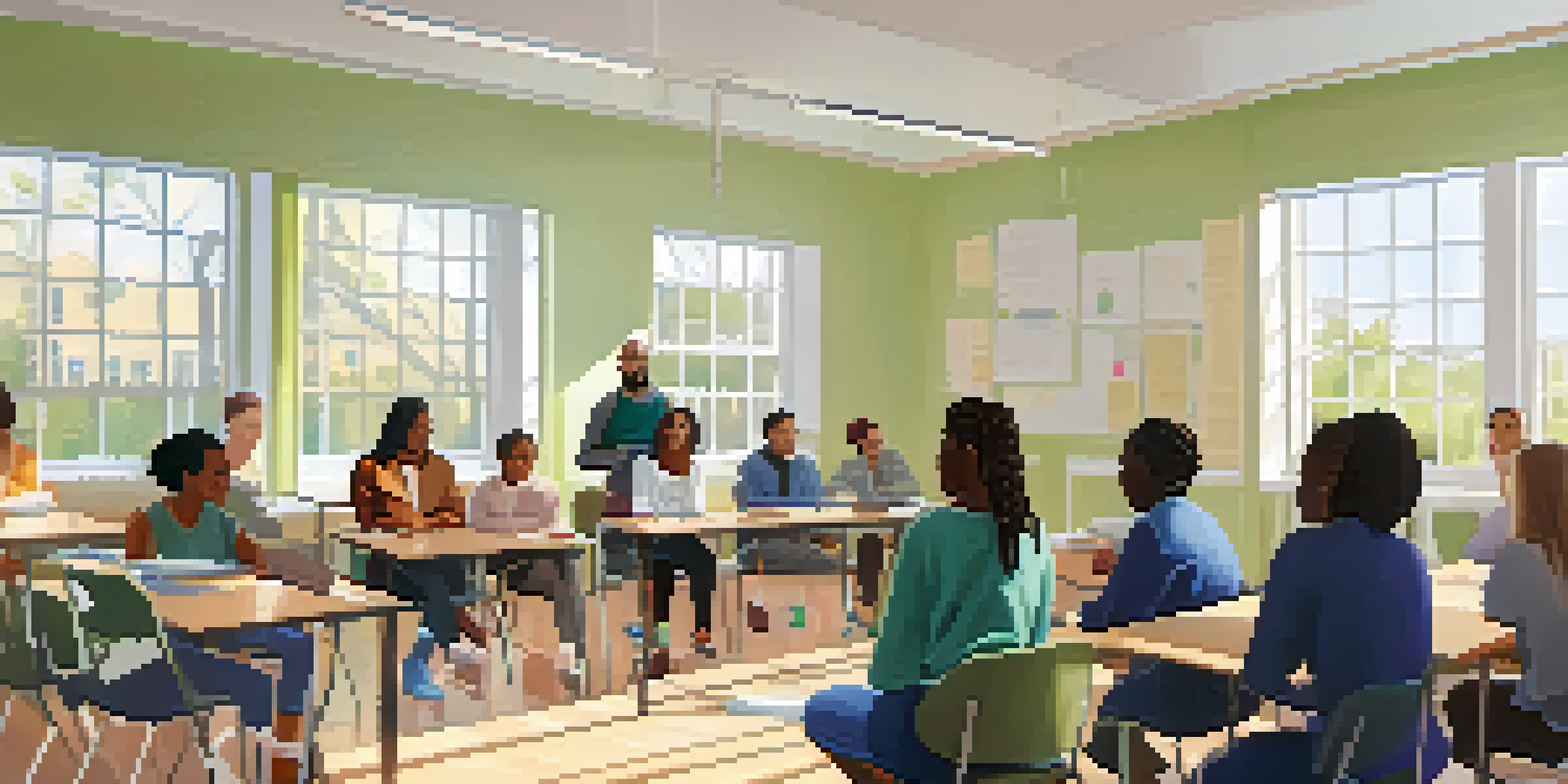Youth Mental Health First Aid: Training for Caregivers

What is Youth Mental Health First Aid?
Youth Mental Health First Aid (YMHFA) is a training program designed to help caregivers, teachers, and community members support young people facing mental health challenges. Similar to traditional first aid, it equips individuals with the skills to recognize and respond to mental health crises. This approach emphasizes early intervention and understanding, which can significantly impact a youth's recovery journey.
Mental health is not a destination, but a process. It's about how you drive, not where you're going.
The training covers various mental health issues, including anxiety, depression, and substance use disorders. Participants learn the signs and symptoms of these conditions, helping them identify potential problems in the youth they care for. By fostering a supportive environment, caregivers can encourage open discussions about mental health, reducing stigma and promoting well-being.
Ultimately, YMHFA aims to create a network of informed and compassionate adults who can act as a first line of defense. By understanding the complexities of youth mental health, caregivers can better support their loved ones and help them navigate challenging times.
The Importance of Training for Caregivers
Training in youth mental health first aid is crucial for caregivers, as it empowers them with knowledge and confidence. When caregivers understand mental health issues, they are better equipped to identify early warning signs and respond effectively. This proactive approach can make a significant difference in a young person's life, potentially preventing further deterioration of their mental health.

Additionally, caregivers often play a pivotal role in a youth’s support system. By receiving training, they can bridge the gap between the youth and professional help, guiding them to appropriate resources when needed. This connection is vital, as young people may hesitate to seek help on their own due to fear or misunderstanding.
YMHFA Empowers Caregivers
Youth Mental Health First Aid training equips caregivers with the skills to recognize and respond to mental health challenges in young people.
Moreover, caregiver training fosters a sense of community, encouraging collaboration among parents, teachers, and mental health professionals. This united front not only enhances individual support but also promotes a culture of understanding and acceptance around mental health issues.
Key Components of YMHFA Training
YMHFA training typically includes several core components designed to provide a comprehensive understanding of youth mental health. Participants learn about common mental health disorders and their impact on young people, as well as effective communication strategies. This knowledge allows caregivers to approach sensitive topics with empathy and clarity.
The greatest weapon against stress is our ability to choose one thought over another.
Another vital aspect of the training is crisis intervention techniques. Caregivers learn how to handle situations where a youth may be in immediate distress, equipping them with the tools needed to de-escalate potential crises. This training ensures that caregivers feel prepared to step in during critical moments, ultimately safeguarding the youth’s well-being.
Participants also engage in interactive scenarios that simulate real-life situations, enhancing their ability to respond effectively. This hands-on approach not only reinforces the concepts learned but also builds confidence in caregivers, making them more likely to take action when necessary.
Recognizing Signs of Mental Health Issues
One of the most valuable skills caregivers gain from YMHFA training is the ability to recognize signs of mental health issues in youth. Symptoms such as changes in behavior, withdrawal from friends, or drastic mood swings can indicate deeper struggles. Being aware of these signs is the first step in providing support and guidance.
Understanding the context behind these behaviors is equally important. Caregivers learn to differentiate between typical adolescent behavior and indicators of potential mental health concerns. This nuanced understanding can prevent misinterpretation and ensure that appropriate actions are taken.
Creating Supportive Environments
Establishing a culture of open dialogue about mental health encourages youth to seek help and fosters trust between caregivers and young people.
Furthermore, caregivers are encouraged to trust their instincts. If something feels off, it’s essential to reach out and engage in a conversation with the youth. By fostering an open dialogue, caregivers can create a safe space for young people to express their feelings and seek help when needed.
Creating a Supportive Environment
A crucial takeaway from YMHFA training is the importance of creating a supportive environment for youth. This involves not only recognizing mental health issues but also fostering a culture where young people feel comfortable discussing their feelings. Caregivers can play a key role in normalizing conversations about mental health, making it easier for youth to seek help.
Building trust is essential in this process. Caregivers should strive to be approachable and non-judgmental, ensuring that youth know they can share their struggles without fear of repercussions. By actively listening and validating their feelings, caregivers can reinforce their role as a supportive presence in the youth's life.
Additionally, caregivers can promote mental well-being by encouraging healthy coping strategies, such as mindfulness, physical activity, and creative outlets. By modeling these behaviors themselves, caregivers can inspire young people to adopt practices that enhance their overall mental health.
The Role of Schools and Community
Schools and community organizations have a significant role in supporting youth mental health and implementing YMHFA training. By collaborating with trained caregivers, they can create a comprehensive support system that extends beyond the home. This collective effort ensures that young people receive consistent messages about the importance of mental well-being.
Implementing YMHFA training in schools not only prepares teachers and staff to identify and assist struggling students but also fosters a culture of awareness. When educators are equipped with the right tools, they can create an environment that prioritizes mental health alongside academic success.
Community Collaboration is Key
Schools and community organizations play a vital role in supporting youth mental health by implementing YMHFA training and creating a comprehensive support network.
Community involvement is equally vital. Local organizations can partner with schools to provide resources, workshops, and support groups that further enhance youth mental health initiatives. By working together, the community can create a safety net for young people, ensuring that help is accessible and readily available.
Continuing Education and Support for Caregivers
YMHFA training is just the beginning of a caregiver's journey in supporting youth mental health. Ongoing education and support are essential for caregivers to stay informed about the latest resources and best practices. Joining local support groups or online forums can provide caregivers with valuable insights and encouragement from others in similar situations.
Regular workshops and refresher courses can help caregivers maintain their skills and adapt to the evolving landscape of mental health. These opportunities not only enhance their knowledge but also foster a sense of community among caregivers, allowing them to share experiences and strategies.

Ultimately, by committing to lifelong learning, caregivers can ensure they are always prepared to support the youth in their lives. This dedication not only benefits the young people they care for but also enriches the caregiver’s own understanding and approach to mental health.